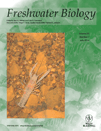
FRESHWATER BIOLOGY
metrics 2024
Pioneering Insights into Freshwater Ecology
Introduction
Freshwater Biology is a premier academic journal dedicated to advancing the study of freshwater ecosystems and their biological diversity. Published by Wiley, this highly esteemed journal features an impact factor that reflects its influence within the field of aquatic science, maintaining a distinguished Q1 rank as per the 2023 standards. The journal is recognized for its comprehensive coverage of original research articles, review papers, and methodological advancements that address a range of topics from ecological interactions to conservation strategies in freshwater environments. With its extensive archive dating from 1971 to 2024, Freshwater Biology serves as an invaluable resource for researchers, professionals, and students looking to deepen their understanding of aquatic systems. Though it does not currently offer Open Access options, readers can access vital findings and contribute to the ongoing discourse in this critical area of study. Based in the United Kingdom, with its commitment to rigorous peer-review and high publication standards, Freshwater Biology continues to be a cornerstone publication in the field, enhancing our understanding of freshwater ecosystems and their management.
Metrics 2024
 1.02
1.02 2.80
2.80 3.50
3.50 177
177Metrics History
Rank 2024
Scopus
IF (Web Of Science)
JCI (Web Of Science)
Quartile History
Similar Journals

MARINE AND FRESHWATER BEHAVIOUR AND PHYSIOLOGY
Diving Deep into Behavioral Science of Aquatic OrganismsMARINE AND FRESHWATER BEHAVIOUR AND PHYSIOLOGY, published by Taylor & Francis Ltd, is a renowned academic journal dedicated to advancing the understanding of the behavioral and physiological aspects of aquatic organisms. Established in 1994, the journal serves as a pivotal platform for researchers and professionals in the fields of Aquatic Science and Oceanography, offering valuable insights into the interactions between aquatic species and their environments. With an impact factor reflecting its significance in the academic community, it occupies a notable position in Category Quartiles, currently ranking Q3 in both Aquatic Science and Oceanography. Researchers are encouraged to explore a wide range of topics reflecting the complexity and diversity of marine and freshwater ecosystems. Although the journal is not open access, its contributions continue to influence both current research and future investigations, making it an essential resource for anyone engaged in the study of aquatic life.
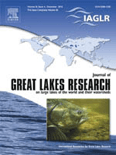
JOURNAL OF GREAT LAKES RESEARCH
Advancing Knowledge of the Great Lakes EcosystemJOURNAL OF GREAT LAKES RESEARCH is a prestigious academic journal published by Elsevier Science Ltd, focused on the vital field of aquatic sciences and ecology. With a long-standing history since its inception in 1975, this journal proudly ranks in the Q1 quartile across multiple categories, including Aquatic Science and Ecology, as of 2023, reflecting its significant contribution to the scientific community. The journal's impact is underscored by its impressive Scopus rankings, placing it within the top percentile of scholarly publications in related disciplines. Although it operates under a subscription model, its influence extends globally, serving as a critical resource for researchers and professionals dedicated to understanding the Great Lakes ecosystem and its broader ecological implications. As it converges into its future publications through 2024, JOURNAL OF GREAT LAKES RESEARCH remains an essential platform for innovative research that shapes environmental policy and promotes sustainable practices in aquatic environments.

Inland Water Biology
Advancing Knowledge in Inland Water EcologyInland Water Biology is a distinguished peer-reviewed journal published by MAIK NAUKA/INTERPERIODICA/SPRINGER, focusing on the intricate interactions within freshwater ecosystems. With its ISSN (1995-0829) and E-ISSN (1995-0837), this journal has established itself as an essential resource for researchers and professionals in the fields of Aquatic Science and Ecology, evidenced by its consistent ranking in the Q3 category for both disciplines in 2023. Covering a wide array of topics related to the biology of inland waters, the journal aims to disseminate cutting-edge research findings and theoretical advancements that contribute to the understanding of aquatic environments and their ecological significance. Although it does not offer open access, its impact in the academic community is noteworthy, ensuring that published works undergo rigorous peer review. Researchers, professionals, and students alike will find valuable insights and innovative approaches within its pages, making Inland Water Biology a vital addition to their academic endeavors.

Inland Waters
Elevating Understanding of Critical Freshwater IssuesInland Waters, published by TAYLOR & FRANCIS LTD, stands as a prestigious scholarly journal dedicated to the critical examination of freshwater ecosystems and their management. With an ISSN of 2044-2041 and an E-ISSN of 2044-205X, this journal boasts a remarkable Q1 ranking in both Aquatic Science and Water Science and Technology for 2023, reflecting its significant impact in the field. Researchers and professionals can benefit from its comprehensive coverage of cutting-edge research, methodological advancements, and policy implications concerning inland waters. Committed to disseminating valuable knowledge in a vital area of environmental science, Inland Waters aims to foster collaboration and promote innovative solutions for sustainable water management practices. As it continues through its converged years from 2012 to 2024, the journal remains an essential resource for those dedicated to advancing our understanding and stewardship of freshwater environments worldwide.

MARINE AND FRESHWATER RESEARCH
Bridging science and environmental stewardship.Marine and Freshwater Research is a prestigious journal published by CSIRO PUBLISHING that serves as a key platform for the dissemination of cutting-edge research in the fields of Aquatic Science, Ecology, and Oceanography. With an impactful presence since its inception in 1948, the journal provides critical insights into the dynamics of freshwater and marine ecosystems, promoting interdisciplinary approaches that contribute to our understanding of biodiversity and sustainability. Currently ranked in the Q2 category across major scientific domains, including Ecology and Aquatic Science, it enjoys a robust academic reputation supported by impressive Scopus rankings, such as Rank #66/247 in Aquatic Science and Rank #44/145 in Oceanography, reflecting its high citation impact and relevance. While offering a subscription-based access model, the journal remains dedicated to fostering dialogue and innovation within the scientific community, aiming to bridge the gap between research findings and practical applications in environmental management. Located in Australia, Marine and Freshwater Research is an essential resource for researchers, professionals, and students dedicated to exploring the complexities of aquatic ecosystems and advocating for their preservation.
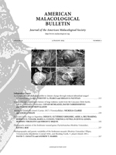
AMERICAN MALACOLOGICAL BULLETIN
Unveiling the Secrets of Marine Biodiversity.American Malacological Bulletin is a distinguished journal published by the American Malacological Society, Inc., dedicated to advancing the field of malacology, which encompasses the study of mollusks and their ecological significance. Since its inception, the journal has provided a vital platform for the dissemination of research findings, reviews, and significant contributions from both established and emerging scholars. With an ISSN of 0740-2783 and an E-ISSN of 2162-2698, it holds a global reputation within its niche, albeit recognized within the Q4 category in both Aquatic Science and Ecology, Evolution, Behavior and Systematics based on its 2023 ranking. The bulletin's focus on fostering dialogue and collaboration among researchers around the world underscores its importance within the scientific community. As a resource housed in the Delaware Museum of Natural History, it actively contributes to the ongoing conversation on ecological conservation, biodiversity, and the evolving challenges facing marine ecosystems. Though not classified as an Open Access journal, it remains accessible to scholars and students eager to explore contemporary research in malacology.

Water Biology and Security
Connecting scholars to shape the future of water security.Water Biology and Security, published by KEAI PUBLISHING LTD, is a pivotal open-access journal that has been addressing critical issues in the interdisciplinary fields of water sciences, aquatic biology, and environmental sustainability since its inception in 2022. With an E-ISSN of 2772-7351 and a distinguished ranking within the top quartile (Q1) of several categories including Agricultural and Biological Sciences, Animal Science and Zoology, Aquatic Science, and Water Science and Technology, the journal stands out as a leading platform for innovative research. Based in Beijing, China, and supported by an impressive impact factor derived from its Scopus rankings, the journal aims to disseminate high-quality and impactful research that addresses the challenges related to water resources and ecosystems. Its open-access format enhances accessibility, ensuring that vital information reaches policymakers, practitioners, and scholars worldwide. As we converge through 2024, the journal aspires to foster a vibrant scholarly community, facilitating dialogues that inform practice and advance the scientific understanding of aquatic environments.
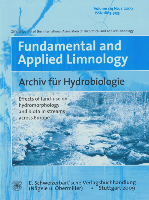
Fundamental and Applied Limnology
Unveiling Aquatic Mysteries: A Platform for Freshwater ScholarshipFundamental and Applied Limnology is an esteemed academic journal dedicated to the exploration of freshwater ecosystems, bridging the gap between fundamental research and practical applications. Published by E Schweizerbart'sche Verlagsbuchhandlung in Germany, this journal has been a vital resource in the fields of aquatic science and ecology since its inception in 2007. With its ISSN 1863-9135 and E-ISSN 1863-9135, it provides a platform for researchers to disseminate significant findings related to limnology, contributing to a rich understanding of freshwater biodiversity, water quality, and ecological interactions. Although currently rated in the Q3 quartile for aquatic sciences and ecology as per the 2023 rankings, it remains a valuable outlet for interdisciplinary research and practical insights, facilitating critical advancements in environmental management. Open access options enhance its visibility and accessibility, making it indispensable for researchers, professionals, and students alike who are committed to advancing the scholarship in freshwater studies. Engaging with this journal not only opens doors to the latest research findings but also fosters collaboration and innovation in the ecological community.
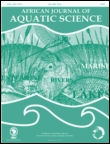
AFRICAN JOURNAL OF AQUATIC SCIENCE
Championing ecological insights for thriving aquatic environments.AFRICAN JOURNAL OF AQUATIC SCIENCE, published by TAYLOR & FRANCIS LTD, is a premier scholarly journal dedicated to the field of aquatic science, ecology, and environmental management, playing a crucial role in advancing research and knowledge in these vital areas. With an impressive Q2 ranking in both Aquatic Science and Ecology, Evolution, Behavior and Systematics, the journal seeks to publish high-quality research encompassing a wide range of topics related to freshwater and marine ecosystems, including biodiversity, conservation strategies, and the impacts of climate change. Featuring a rich history of publication from 2000 to 2024, the journal not only embraces rigorous peer review but also aims to foster collaboration and dialogue among researchers, practitioners, and students interested in aquatic environments. Readers will find that the journal’s commitment to impactful scientific communication is reflected in its notable rankings within the Scopus database, making it an essential resource for those engaged in aquatic research and management.

Hidrobiologica
Connecting researchers to the pulse of our waters.Hidrobiologica is a pivotal academic journal dedicated to the field of aquatic sciences and ecology, published by UNIV AUTONOMA METROPOLITANA-IZTAPALAPA in Mexico. With a commitment to fostering research from diverse ecosystems, this journal encourages the dissemination of knowledge spanning aquatic environments, ecological interactions, and marine biodiversity. Although classified in the Q4 category across various relevant fields such as Aquatic Science and Oceanography, Hidrobiologica is focused on increasing visibility and engagement among scholars by providing a platform for innovative research that addresses contemporary ecological challenges. The journal's address reflects its deep-rooted commitment to local and regional aquatic research, yet it aims to resonate with a global audience. Researchers, professionals, and students alike will find value in the journal's scope, which spans from 2007 to 2024, making it a valuable resource for understanding advancements in aquatic studies. While not an open-access journal, it continues to be a significant contributor to the academic dialogue in aquatic sciences.